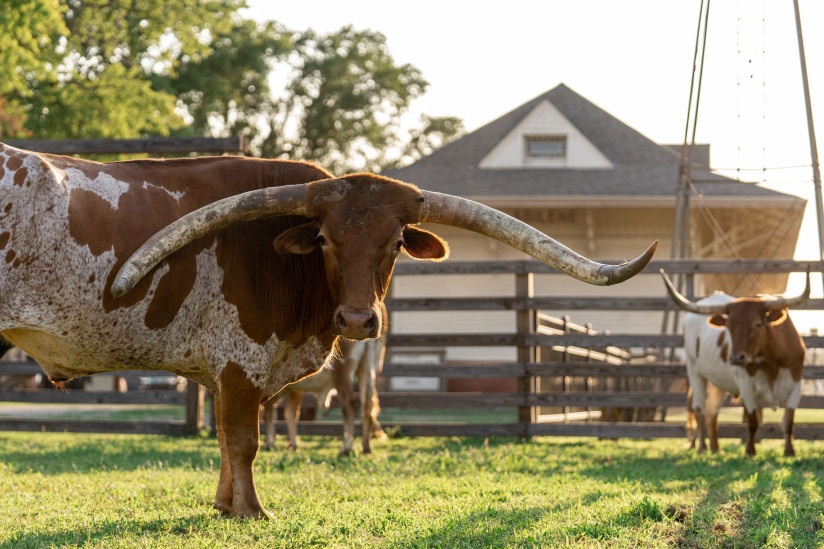10 Things You Need to Know About Joseph McCoy and the Chisholm Trail
 Visit the best of the west, and discover the incredible story of Joseph G. McCoy, the man who transformed Abilene into the first cattle boomtown in America. As we gear up for Chisholm Trail Days this weekend, here are ten fascinating facts about McCoy and the Chisholm Trail that shaped the Wild West!
Visit the best of the west, and discover the incredible story of Joseph G. McCoy, the man who transformed Abilene into the first cattle boomtown in America. As we gear up for Chisholm Trail Days this weekend, here are ten fascinating facts about McCoy and the Chisholm Trail that shaped the Wild West!
1. Joseph McCoy’s Vision Changed the Cattle Industry Forever
Joseph G. McCoy, a farmer from Illinois, came to Kansas in 1867 with a bold plan. He saw an opportunity to turn the vast herds of Texas longhorns into a profitable business by driving them to Kansas and shipping them to Northern markets, bypassing quarantine lines that had restricted cattle movement due to Texas Fever.
2. Abilene: The Chosen Cattle Town
After being rejected by multiple Kansas towns, McCoy set his sights on Abilene, a small community of dugouts and sod houses. Despite Abilene's location within the quarantine lines, McCoy persuaded Kansas Governor Samuel Crawford to allow Texas cattle into the area, setting the stage for Abilene’s transformation into a bustling cattle town.
3. The Birth of the Chisholm Trail
Although not originally named the Chisholm Trail, McCoy played a significant role in marking the path for cattle drives. He sent Timothy Hersey to survey and mark the trail, which later took its famous name, linking Texas cattle herds to Abilene and other Kansas railheads.
4. The Drover’s Cottage: A Wild West Hotel
To cater to cattle barons and drovers, McCoy built the Drover’s Cottage in Abilene, one of the finest hotels in the West. This establishment became a hub for cattle traders and cowboys, offering a place to rest after long, grueling drives along the trail.
5. A Boomtown Is Born
Abilene's stockyards saw immediate success. In 1867, 35,000 head of cattle arrived, growing to an astonishing 600,000 by 1871. Abilene’s rapid growth spurred the development of saloons, hotels, general stores, and boarding houses, turning the once-sleepy town into a thriving center of trade and cowboy culture.
6. McCoy’s Showmanship Saved the Day
When concerns over Texas Fever threatened McCoy’s business, he launched a clever marketing campaign, showcasing cowboy skills and organizing buffalo hunts for his buyers. These events impressed Eastern investors and reignited confidence in McCoy’s cattle trade, helping Abilene's stockyards flourish once again.
7. The Rise and Fall of Abilene’s Cattle Trade
Abilene's economy boomed with the influx of cattle and cowboys, with over $900,000 passing through the First National Bank of Abilene in just two months—equivalent to over $19 million today. But by 1872, mounting concerns about Texas Fever and rowdy cowboys led to an ordinance banning Texas cattle, bringing Abilene’s reign as a cattle town to an abrupt end.
8. The Economic Impact on Abilene
During its peak, Abilene’s cattle trade fueled economic growth, with businesses flourishing and a population surge. Cowboys, who were paid off at the end of their drives, spent their money freely in Abilene’s saloons, shops, and hotels, making the town a vibrant center of commerce and culture.
9. McCoy’s Disputes with the Railroad
McCoy’s partnership with the Union Pacific Railway initially promised financial rewards, but a lack of a formal contract led to disputes over payments. Despite shipping thousands of cattle, McCoy had to sue the railway to recover the money owed to him, highlighting the challenges he faced even in success.
10. McCoy’s Legacy Lives On
Although Abilene’s cattle boom was short-lived, McCoy’s impact on the cattle industry and the development of the Chisholm Trail is undeniable. His vision and entrepreneurial spirit not only put Abilene on the map but also helped shape the legendary cowboy era that defined the American West.
Celebrate McCoy’s Legacy at Chisholm Trail Days!
Join us in Abilene this weekend to honor Joseph McCoy, the Chisholm Trail, and the cowboys who made history. Enjoy a longhorn cattle drive, reenactments, live music, and the rich stories of the Wild West at! Don’t miss this opportunity to experience the vibrant heritage that McCoy helped create in Abilene, Kansas.
